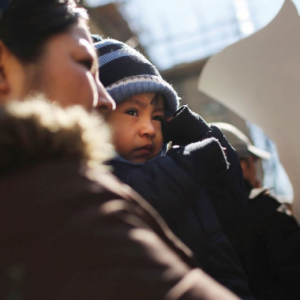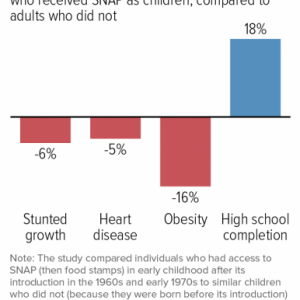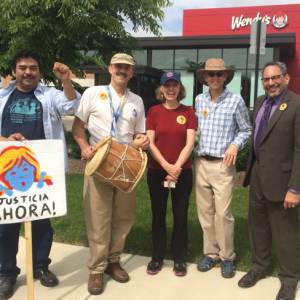“WE CELEBRATE the 40 years of ministry of the National Farm Worker Ministry!”
I am Dominique Aulisio. Through volunteering with NFWM and starting a Youth and Young Adult Network chapter in Orlando, I have had the opportunity to get to know farm workers and work hand in hand with them to fight the injustice they face.
YAYAs learn about hope, share in each others’ cultures, and learn the organizing skills we need to impact our world. As a young person, working with NFWM as an ally to farm workers has given me confidence in our power to change the systems that oppress farm workers and keep our communities divided. NFWM/YAYA is unique and vital to the farm worker movement and to the broader fight for social justice. I am grateful to have the continued opportunity to work alongside NFWM in the farm worker movement.
 I am Olgha Sierra Sandman. I came from Mexico to enter a college for women in training for missionary work hoping to be sent to Africa. That changed when I had the opportunity to work for two summers for the National Migrant Ministry. After my marriage to Rev. Bob Sandman, we continued in Migrant Ministry.
I am Olgha Sierra Sandman. I came from Mexico to enter a college for women in training for missionary work hoping to be sent to Africa. That changed when I had the opportunity to work for two summers for the National Migrant Ministry. After my marriage to Rev. Bob Sandman, we continued in Migrant Ministry.
In May 1971, I attended the first meeting of the National Farm Worker Ministry Board in La Paz, CA. I was fortunate to be a part of the evolving of the Migrant Ministry into the National Farm Worker Ministry. NFWM opened the door widely and I entered. The farm workers also opened their arms and embraced me, both giving me many opportunities to work side by side.
Forty years later, I reflect in gratitude and praise God, for giving me this life-time opportunity to be part of a movement of justice, for learning from the farm workers about self-determination and sacrifice, about fighting for dignity, and respect and for bringing to our tables the food that sustains life.
Written in my heart are Cesar Chavez’s words of wisdom: “When you work for justice, you can’t afford being a sprinter, you must be a long distance runner.” As I approach the finishing line, I’m ready to pass the baton on to all future runners for justice who will, as I have, stay the course and support the National Farm Worker Ministry and its courageous stand to be faithful to the struggle of the farm workers.
 I am Maria Vidal. Years ago, I worked in the fields picking apricots and peaches near Stockton, California. When I learned that 15 farm workers had died from heat stress in California’s fields since 2005, I was motivated to act.
I am Maria Vidal. Years ago, I worked in the fields picking apricots and peaches near Stockton, California. When I learned that 15 farm workers had died from heat stress in California’s fields since 2005, I was motivated to act.
Now I am a volunteer with the National Farm Worker Ministry’s Support Group, LIVE – Luces y Voces de Esperanza. I and my fellow supporters seek ways that our people can be valued for their work. Above all, we bring farm workers hope that their dignity as persons will be respected. We let them know that they are not alone. It is a privilege to give my time and be in solidarity with the National Farm Worker Ministry, because NFWM works to see to it that farm workers have a voice.
And you can celebrate and contribute to the work of NFWM
Read more »
 The really good news: Seventy-four percent of respondents (including 58 percent of Republicans) said they back boosting the minimum wage from its current level of $7.25 an hour to $9 over the course of two years, according to a poll this year. Another poll shows that 48% of Americans favor raising the minimum wage to $15 an hour…. Read more »
The really good news: Seventy-four percent of respondents (including 58 percent of Republicans) said they back boosting the minimum wage from its current level of $7.25 an hour to $9 over the course of two years, according to a poll this year. Another poll shows that 48% of Americans favor raising the minimum wage to $15 an hour…. Read more »
 The really good news: Seventy-four percent of respondents (including 58 percent of Republicans) said they back boosting the minimum wage from its current level of $7.25 an hour to $9 over the course of two years, according to a poll this year. Another poll shows that 48% of Americans favor raising the minimum wage to $15 an hour…. Read more »
The really good news: Seventy-four percent of respondents (including 58 percent of Republicans) said they back boosting the minimum wage from its current level of $7.25 an hour to $9 over the course of two years, according to a poll this year. Another poll shows that 48% of Americans favor raising the minimum wage to $15 an hour…. Read more »
 ONCE UPON A TIME… a precious planet called Earth was tousled by ferocious disasters, more and more each year! Epic fires, hurricanes, floods and droughts uprooted lives and destroyed nature along with the many edifices built by humans. The faith of the religious was tested, as damage, deluges and death brought to mind the story in…
ONCE UPON A TIME… a precious planet called Earth was tousled by ferocious disasters, more and more each year! Epic fires, hurricanes, floods and droughts uprooted lives and destroyed nature along with the many edifices built by humans. The faith of the religious was tested, as damage, deluges and death brought to mind the story in…  The Senate is expected to vote on a regressive tax bill next week, and your voice advocating for a moral and compassionate budget is critical! For Presbyterians, the message is biblical and simple. Urge your Senators to say “no” on the Tax Cuts and Jobs Act, because it will make hunger and poverty worse and will further deepen…
The Senate is expected to vote on a regressive tax bill next week, and your voice advocating for a moral and compassionate budget is critical! For Presbyterians, the message is biblical and simple. Urge your Senators to say “no” on the Tax Cuts and Jobs Act, because it will make hunger and poverty worse and will further deepen…  The PC(USA) was the first Christian denomination to sign on for the national boycott, the timing of which anticipates the company’s annual meeting on May 26. “Rather than support Florida growers who uphold human rights under the Fair Food Program, Wendy’s switched its tomato purchases to Mexico, where the denial of human rights in the…
The PC(USA) was the first Christian denomination to sign on for the national boycott, the timing of which anticipates the company’s annual meeting on May 26. “Rather than support Florida growers who uphold human rights under the Fair Food Program, Wendy’s switched its tomato purchases to Mexico, where the denial of human rights in the… 
 I am Olgha Sierra Sandman. I came from Mexico to enter a college for women in training for missionary work hoping to be sent to Africa. That changed when I had the opportunity to work for two summers for the National Migrant Ministry. After my marriage to Rev. Bob Sandman, we continued in Migrant Ministry.
I am Olgha Sierra Sandman. I came from Mexico to enter a college for women in training for missionary work hoping to be sent to Africa. That changed when I had the opportunity to work for two summers for the National Migrant Ministry. After my marriage to Rev. Bob Sandman, we continued in Migrant Ministry. I am Maria Vidal. Years ago, I worked in the fields picking apricots and peaches near Stockton, California. When I learned that 15 farm workers had died from heat stress in California’s fields since 2005, I was motivated to act.
I am Maria Vidal. Years ago, I worked in the fields picking apricots and peaches near Stockton, California. When I learned that 15 farm workers had died from heat stress in California’s fields since 2005, I was motivated to act.